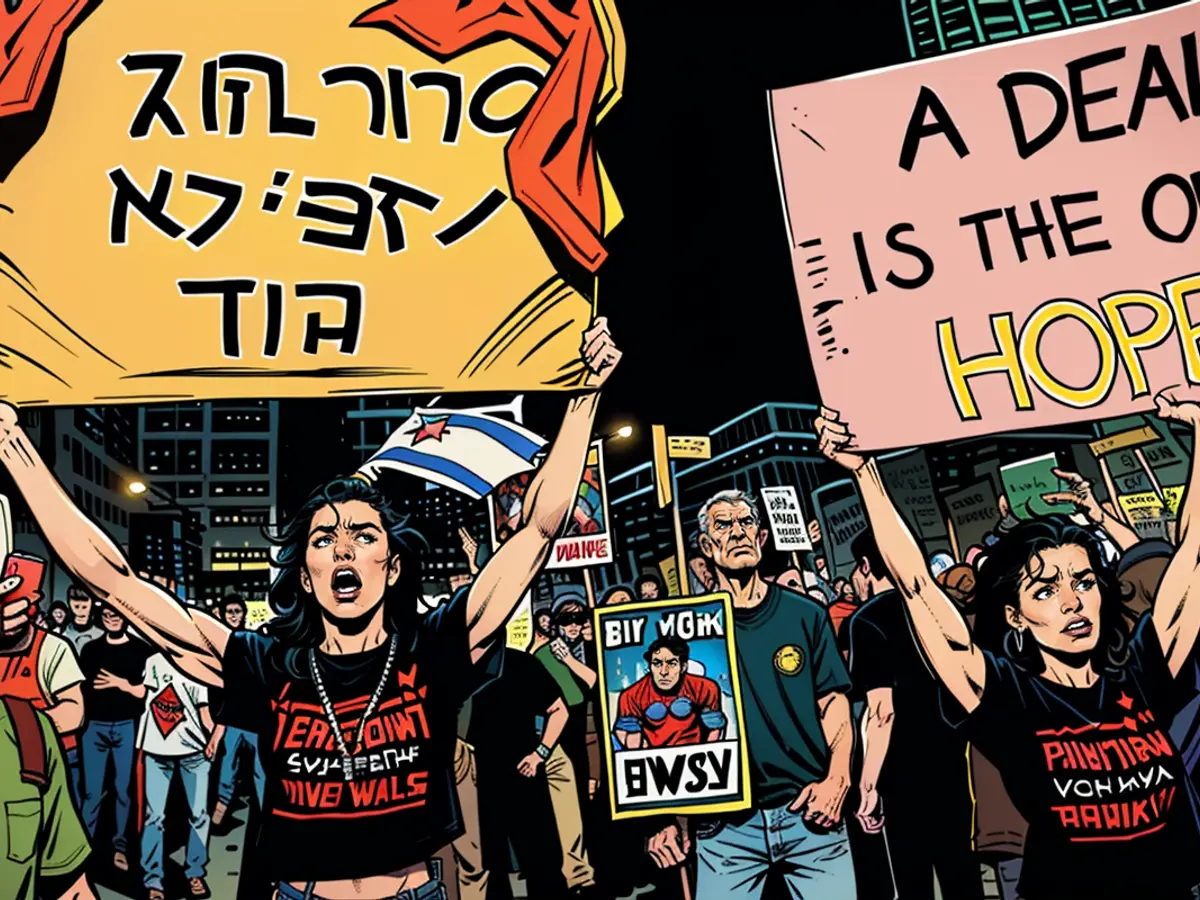- Critical period for negotiations on Gaza truce deliberations
Upcoming Peace Talks in Gaza Conflict Reach Crucial Stage
The international push for a ceasefire in the Gaza conflict is set to hit a high point this week. United States Secretary of State Antony Blinken is scheduled to meet with Israeli Prime Minister Benjamin Netanyahu on Monday, as part of an attempt to resolve the stalemate in negotiations. During the week, smaller group meetings will be held in Cairo to address outstanding issues, leading up to a major leaders' summit in Cairo within a week. The US, Qatar, and Egypt are facilitating the indirect discussions between Israel and Hamas.
The US aims to bring an end to the Gaza conflict and related conflicts in the Middle East ahead of the decisive phase of the US presidential race, according to the Israeli newspaper "Yediot Ahronot". The US election is scheduled for early November.
Several thousand Israelis protested on Saturday evening, demanding a deal for the release of additional hostages in exchange for Palestinian prisoners. The protesters once again called for Netanyahu's resignation and new elections, accusing him of hindering a deal and succumbing to the demands of his right-wing coalition partners.
Border Control Remains a Contentious Issue
Israel's demand for permanent control of the border between the Gaza Strip and Egypt is seen as one of the final barriers to an agreement. Initial US proposals to resolve outstanding issues did not include this demand, according to Israeli broadcaster Channel 12. Hamas alleges that Israel is obstructing negotiations by refusing to withdraw from the Philadelphi Corridor, which runs along the southern Gaza border with Egypt. Hamas seeks a complete Israeli withdrawal.
Netanyahu, however, insists that the army should retain control of the Philadelphi Corridor even after a ceasefire, to prevent weapons smuggling. Another point of contention is the issue of the return of displaced residents from the southern Gaza Strip to the northern part of the sealed coastal region. Netanyahu wants an agreement that prevents the return of armed Hamas fighters to the north.
Israeli Chief of Staff Herzi Halevi said recently that the army could maintain control of the Philadelphi Corridor with occasional incursions, without a constant presence.
The Israeli negotiating team has expressed cautious optimism about a ceasefire following the latest talks in Doha. A deal based on the revised US proposal is said to contain "acceptable elements for Israel," according to a statement from Netanyahu's office.
Potential for Escalation
Foreign Minister Annalena Baerbock (Greens) and her counterparts from France, Britain, and Italy expressed hope in a statement regarding the prospect of another summit and preparations for it. "We urge all parties to continue to engage positively and flexibly in this process," they wrote. They emphasized the importance of avoiding actions that could lead to escalation and harm the prospects for peace. "Too much is at stake," they warned.
Translation:
Iran and the Hezbollah militia in Lebanon had vowed retaliation after the killing of Hamas' external chief Ismail Haniyeh and a Hezbollah military commander in Tehran over two weeks ago. An attack has been expected since then. Both are allied with Hamas and might hold back from a larger, potentially coordinated strike against Israel in the event of a ceasefire in Gaza.
A Hamas representative not involved in the Doha talks expressed caution about the summit's outcome. US President Joe Biden presented a proposal to end the war in three phases in May. It initially calls for an open-ended six-week ceasefire during which specific hostages would be released. In return, Palestinians imprisoned in Israel would be freed. Afterwards, the fighting would be permanently halted, and the remaining hostages would be released. In the final phase, the reconstruction of Gaza would begin.
According to Israeli estimates, Hamas continues to hold 115 hostages, of whom Israel has declared 41 dead. It is believed that several other hostages, whose fate is unknown, may no longer be alive.
The Gaza conflict was sparked by a terror attack by Hamas and other extremists from Gaza on southern Israel on October 7. Over 1,200 people were killed, and about 250 more were abducted into Gaza. According to figures from the Hamas-controlled health authority, over 40,000 people have died in the besieged coastal region since the conflict began.
The US President of the United States, Joe Biden, presented a proposal to end the Gaza conflict in three phases last May. The President of the United States is closely involved in the international push for a ceasefire in the Gaza conflict, with Secretary of State Antony Blinken scheduled to meet with Israeli Prime Minister Benjamin Netanyahu.








